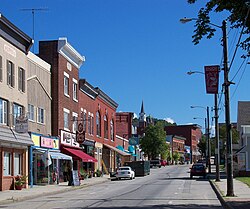Berlin, New Hampshire | |
|---|---|
City | |
 Downtown Berlin | |
| Nicknames: | |
| Motto: Your Adventure Starts Here[2] | |
 Location in New Hampshire | |
| Coordinates: 44°28′07″N 71°11′02″W / 44.46861°N 71.18389°W | |
| Country | United States |
| State | New Hampshire |
| County | Coös |
| Town | 1829 |
| City | 1897 |
| Government | |
| • Mayor | Robert Cone |
| • City Council | Members
|
| • City Manager | Phillip L. Warren Jr. |
| Area | |
• Total | 62.20 sq mi (161.10 km2) |
| • Land | 61.35 sq mi (158.89 km2) |
| • Water | 0.85 sq mi (2.21 km2) |
| Elevation | 1,020 ft (310 m) |
| Population (2020) | |
• Total | 9,425 |
| • Density | 153.63/sq mi (59.32/km2) |
| Time zone | UTC−5 (EST) |
| • Summer (DST) | UTC−4 (EDT) |
| ZIP Code | 03570 |
| Area code | 603 |
| FIPS code | 33-05140 |
| GNIS feature ID | 0871491 |
| Website | www |
Berlin (/ˈbɜːrlɪn/ BUR-lin)[4] is a city along the Androscoggin River in Coös County in northern New Hampshire, United States. It is the northernmost city in New Hampshire and the only city in Coös County. The population was 9,425 at the 2020 census,[5] down from 10,051 at the 2010 census.[6]
It includes the village of Cascade in the south part of the city. Located in New Hampshire's Great North Woods Region or "North Country", Berlin sits at the edge of the White Mountains, and the city's boundaries extend into the White Mountain National Forest. Berlin is home to the Berlin and Coos County Historical Society's Moffett House Museum & Genealogy Center, Service Credit Union Heritage Park, the Berlin Fish Hatchery, and the White Mountains Community College, member of the Community College System of New Hampshire.
Berlin is the principal city of the Berlin Micropolitan Statistical Area, which includes all of Coös County, New Hampshire, and Essex County, Vermont. Because Quebec is less than 60 miles (100 km) away, Berlin has many people of French Canadian descent in its population. Around 65% of its residents speak a variant of New England French, which is known locally as "Berlin French".[7]
The pronunciation of Berlin was changed to BUR-lin, instead of Ber-LIN (as in Berlin, Germany), during World War I as a patriotic stand against Germany.[8]
- ^ S. Dorman (September 12, 2014). Maine Metaphor: The Green and Blue House. ISBN 9781498201049. Retrieved April 4, 2017.
- ^ Yankee Publishing, Inc. (June 16, 2015). "NH Magazine". Retrieved April 8, 2017.
- ^ "ArcGIS REST Services Directory". United States Census Bureau. Retrieved September 20, 2022.
- ^ "Why Lima, Ohio, and Lima, Peru, Don't Have the Same Pronunciation". All Things Considered. National Public Radio. March 21, 2019. Retrieved May 29, 2019.
- ^ "Berlin city, Coos County, New Hampshire: 2020 DEC Redistricting Data (PL 94-171)". U.S. Census Bureau. Retrieved November 5, 2021.
- ^ "Geographic Identifiers: 2010 Demographic Profile Data (G001): Berlin city, New Hampshire". U.S. Census Bureau, American Factfinder. Archived from the original on February 13, 2020. Retrieved April 12, 2018.
- ^ Sarah Laskow (February 8, 2016). "New Hampshire Mill Workers Invented a New Type of French". Retrieved April 2, 2017.
- ^ "Berlin NH History".
